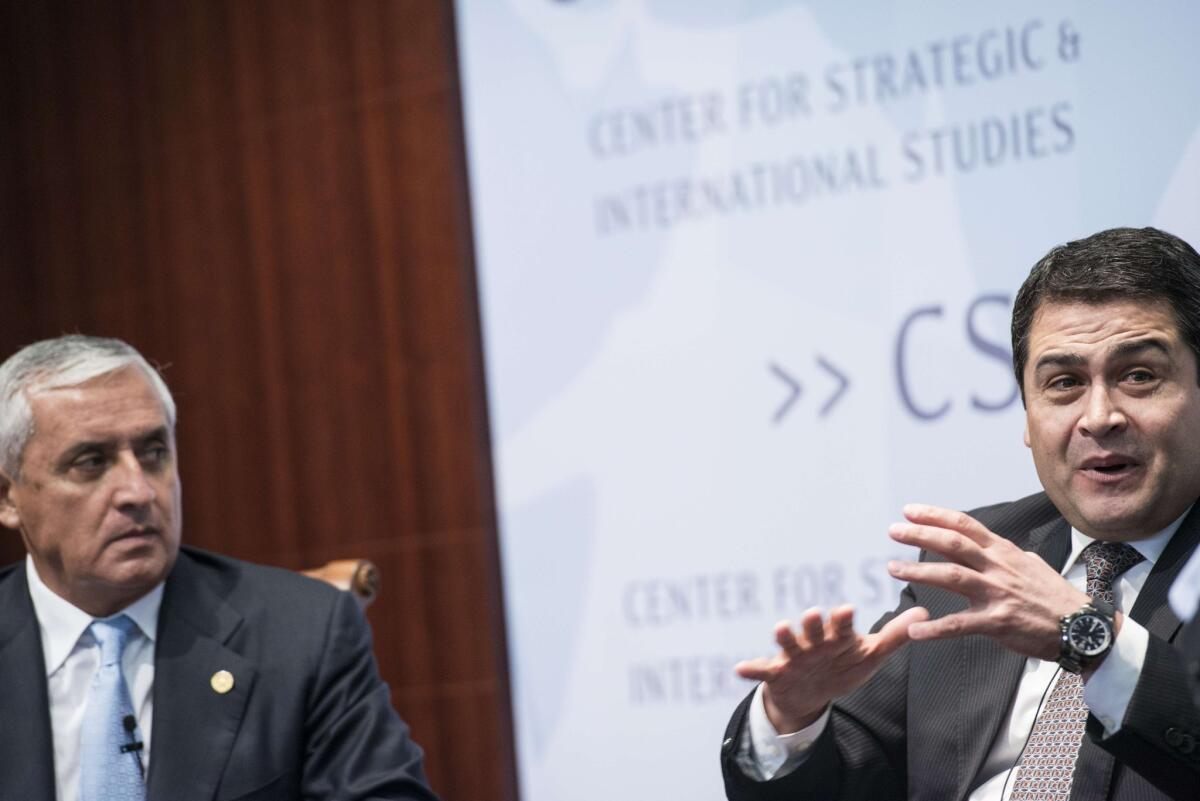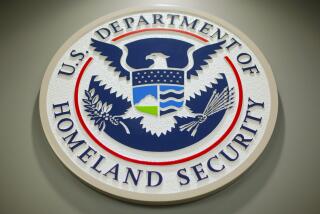Honduran children may be allowed to apply for U.S. admission from home

The White House is considering a proposal that would allow Honduran children to apply for admission to the United States as refugees or on humanitarian grounds while still in their native country.
It is one of several plans under review to deter Central American kids from making the difficult and dangerous journey to the Southwest border, White House officials said Thursday. If successful, the program could be expanded to include other volatile nations, such as Guatemala and El Salvador.
Under the plan, children fleeing dangerous street gangs plaguing cities in Honduras, or other threats, would be interviewed by U.S. immigration officials and sheltered in Honduras while their cases are considered.
Supporters of the plan said it would help children who are genuinely in danger and reduce the number of minors traveling along smuggling routes through Mexico. Critics said it would only increase the number of refugees and worsen the backlog of applications from Central America.
The idea is similar to a proposal from Arizona Sens. John McCain and Jeff Flake, both Republicans, to boost the number of visas by 5,000 for young people coming from Guatemala, Honduras and El Salvador.
Of the 57,000 unaccompanied minors apprehended at the Southwest border since Oct. 1, more than 45,000 have been from these three countries. Their numbers have overwhelmed social services and created a humanitarian crisis.
The presidents of Guatemala and Honduras, who were in Washington on Thursday, said changing the U.S. immigration system would be helpful, but insufficient. If the U.S. wants to stem the tide of children illegally crossing its Southwest border, it should increase investment in Central America to improve security and dismantle drug cartels, they said.
They met with lawmakers on Capitol Hill before speaking about the border crisis at the Center for Strategic and International Studies, a Washington think tank. They are scheduled to meet with President Obama on Friday.
Honduran President Juan Orlando Hernandez said he appreciated the attention the crisis has brought to economic conditions in his country, where 45% of the populace lives on less than $1 a day.
But the vast majority of children are fleeing violence and crime, he said. “Where the greatest drug violence lies — that is where the most children are departing,” he said.
Hernandez said he had been working to purge Honduras of corrupt officials and to extradite accused drug lords to the U.S. He recently launched an overhaul of the government’s immigration department.
“The old immigration officials were in cahoots with the drug traffickers,” he said.
In the last decade, the U.S. has poured billions of dollars into fighting drug cartels in Mexico and Colombia through programs such as the Merida Initiative and Plan Colombia. But the money has largely passed over Central America, Hernandez said.
As a result, drug lords “poured into Central America and linked up with gangs in an unholy alliance,” Hernandez said.
“We are picking up the pieces because they all came home to roost in Central America, and that is what we are dealing with,” he said.
Since 2008, the State Department has spent more than $642 million through a program called the Central America Regional Security Initiative. The money went to countries including Belize, Costa Rica, El Salvador, Guatemala, Honduras, Nicaragua and Panama.
But the program has been too small to be effective, and more money is needed, Hernandez said.
“One dollar of investment in Central America is one dollar invested in U.S. security,” he said.
Congress is unlikely to open the tap for these countries, said Rep. Ted Yoho (R-Fla.), who met with ambassadors from Central American countries this week. He said he told them not to expect a flow of money from the U.S.
“I said, ‘In case you don’t remember, our government shut down last year’” over a budget dispute, he said.
Guatemala President Otto Perez Molina said his country was preparing to receive the children and families who would eventually be deported from the U.S.
But solving the crisis will require more attention and investment from the U.S., he said. Among countries investing in Guatemala, the U.S. ranks seventh, he said — below Canada, Russia and Colombia.
Perez Molina said the violence and crime in Guatemala were a byproduct of the Cold War when the U.S. and the Soviet Union were funding opposite sides of civil wars in Central America to gain influence.
Perez Molina was a top intelligence officer in the Guatemalan military in the 1980s and ’90s.
“We were one of the hot spots in that war,” he said. “The cost to Central America has been that we became a transit corridor and warehouse for drugs going to the U.S.” In 2013, Guatemalan police seized 50,000 weapons that were traced back to the United States, Perez Molina said.
Obama and Vice President Joe Biden will meet with Hernandez, Perez Molina and Salvadoran President Salvador Sanchez Ceren at the White House on Friday.
Biden will host the three leaders for lunch before the meeting. Biden met with Perez Molina and Sanchez Ceren in Guatemala City last month to discuss the humanitarian crisis on the U.S. border. Hernandez skipped the meeting to watch the Honduran national soccer team play at the World Cup in Brazil.
For more reporting on border security follow me on Twitter @ByBrianBennett.
More to Read
Sign up for Essential California
The most important California stories and recommendations in your inbox every morning.
You may occasionally receive promotional content from the Los Angeles Times.











